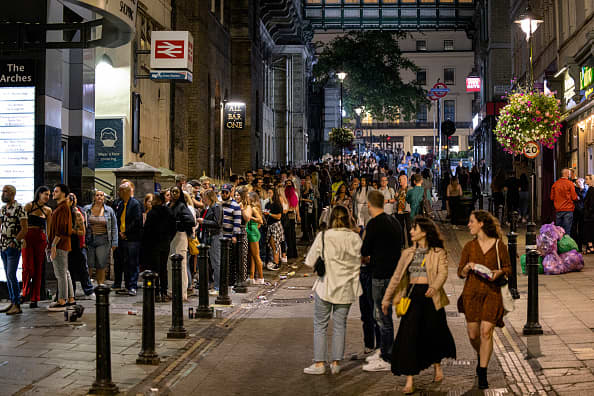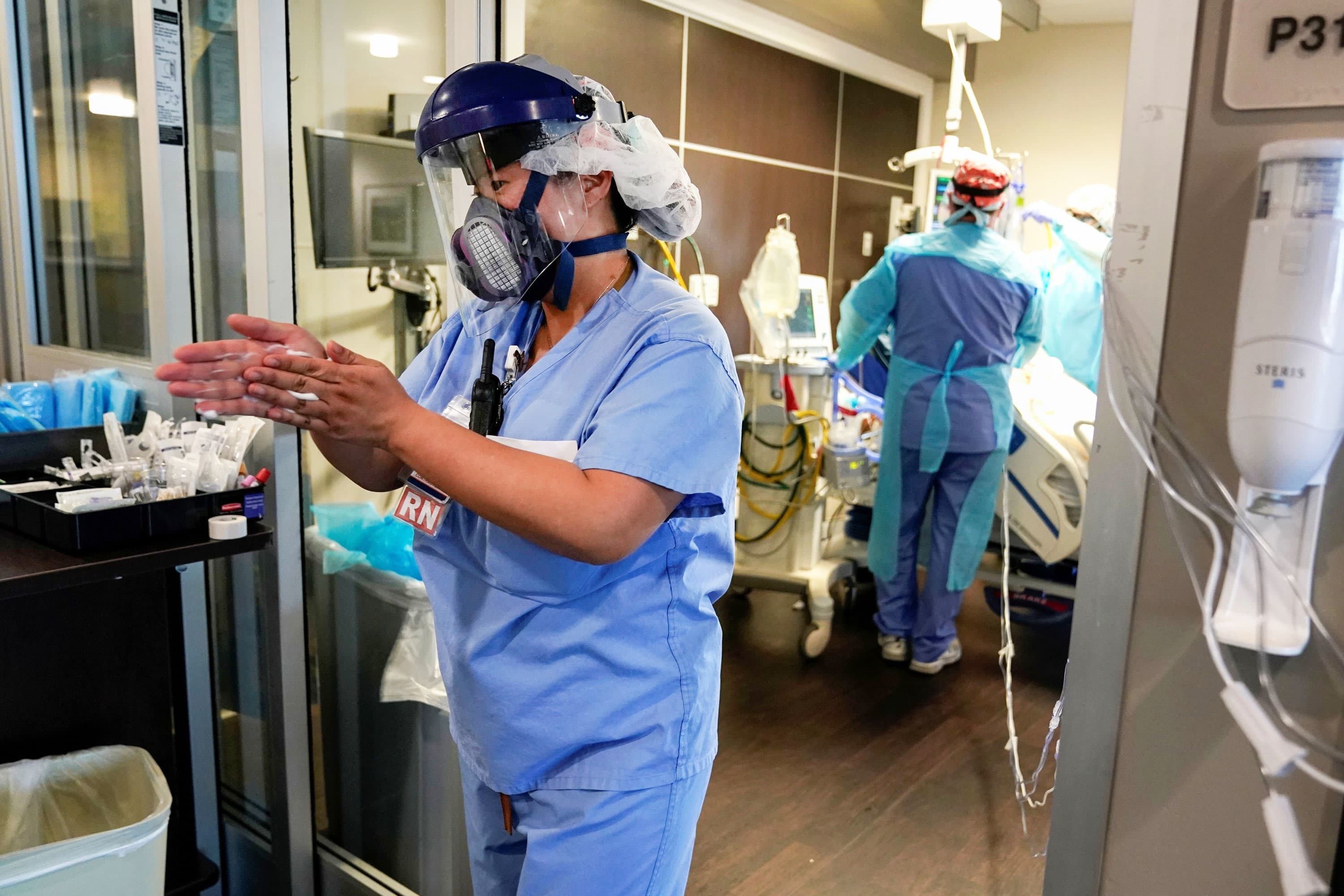The CDC announced last week that it was recommending fully vaccinated people begin wearing masks indoors again in places with high COVID transmission rates, a reversal of previous guidance. The agency is also recommending that school children wear masks this fall, though the guidance is not a mandate, and decisions will be left to the state and local level.
That left the governors of New England's six states scrambling to announce their own guidelines. Some states -- like Connecticut, Maine, Massachusetts and Rhode Island -- have already announced new guidance based on the new CDC recommendations. Others like New Hampshire and Vermont have not.
Here's a closer look at what all six New England states are doing:
Massachusetts
Get New England news, weather forecasts and entertainment stories to your inbox. Sign up for NECN newsletters.
Massachusetts public health officials on Friday began advising vaccinated people who live with any person at high-risk for COVID-19, who have weakened immune systems themselves and who are at an increased risk of severe COVID-19 because of their own age or health conditions to wear a mask or face covering when indoors and not in their own homes.
The shift in state suggestions comes as COVID-19 cases and hospitalizations are on the rise once again, this time propelled by the more contagious Delta variant, and on the heels of a new federal recommendation that even vaccinated people mask up in areas of significant coronavirus transmission.
Also Friday, the Department of Elementary and Secondary Education said it and the Department of Public Health "strongly recommend that all students in kindergarten through grade 6 wear masks when indoors, except students who cannot do so due to medical conditions or behavioral needs" and that "schools allow vaccinated students to remain unmasked."
"Massachusetts is moving forward in this new normal and we're moving forward safely," Gov. Charlie Baker said Friday in Roxbury, where he attended a youth vaccination event.
The updates from DPH and DESE came at the end of a week that saw the U.S. Centers for Disease Control reverse course and recommend that vaccinated people in areas of substantial or high COVID-19 transmission go back to wearing a mask indoors as the Delta variant surges across Massachusetts and the country. In Massachusetts, Barnstable, Bristol, Dukes, Nantucket and Suffolk counties fit that billing.
DPH said it was issuing its updated advisory Friday "in light of the information provided by the CDC, and in order to maximize protection of vulnerable individuals from the Delta variant."
When the mask advisory was issued from DPH late Friday morning, it stated that "the Department of Public Health now advises that a fully vaccinated person should wear a mask or face covering when indoors (and not in your own home) if you have a weakened immune system, or if you are at increased risk for severe disease because of your age or an underlying medical condition, or if someone in your household has a weakened immune system, is at increased risk for severe disease, or is unvaccinated."
New Hampshire
Gov. Chris Sununu said New Hampshire will not be issuing new mask guidance following the Centers for Disease Control and Prevention recommendation that even fully vaccinated people wear masks indoors in areas where COVID-19 transmission is substantial or high.
Four of New Hampshire’s 10 counties and the city of Nashua are experiencing moderate transmission, while the rest of the state is seeing minimal transmission, according to figures released by the Department of Health and Human Services.
“At this point, it isn’t about the government providing that bubble of safety around individuals,” Sununu said last week.
Instead, he said it’s about the individual taking on personal responsibility.
“It is your choice,” Sununu said. “We have all the power to protect ourselves and the community, and that’s getting the vaccine. It’s safe. It’s easy.”
Connecticut
The state Department of Public Health on Sunday issued an alert that strongly recommends all Connecticut residents over 2 years old wear face masks in indoor public spaces, whether they’re vaccinated or not, given the rapid increase in COVID-19 cases over the past two weeks because of the Delta variant.
The warning came as all but one of the state’s eight counties were classified by the U.S. Centers for Disease Control as having “substantial transmission” of COVID-19. The state’s only county with moderate transmission, Litchfield County, has a high likelihood of meeting the substantial threshold soon, the state department said.
DPH on Sunday also urged both vaccinated and unvaccinated residents at high risk for complications of COVID-19, such as individuals with diabetes, compromised immune systems, pregnancy, obesity and asthma, to avoid large indoor gatherings that could include a mix of vaccinated and unvaccinated people.
The agency stressed how vaccination “remains the most important defense against illness and hospitalization.” More than 59% of the population of Connecticut has been fully vaccinated against the coronavirus with more than 64% having received at least one shot of a vaccine.
That’s according to statistics released last week by the state.
Maine
The guidance applies to everyone regardless of vaccination status.
York County, in far southern Maine, and Piscataquis County, in rural northern Maine, are two counties considered to have substantial levels of coronavirus transmission, Maine officials said. The other 14 counties are the site of moderate transmission, officials said.
Gov. Janet Mills encouraged everyone in the state to get vaccinated for coronavirus and wear face coverings in York and Piscataquis counties. She said the change in policy is a recommendation and not a requirement.
“We continue to strongly urge all people to protect themselves, their loved ones, and their communities by getting your shot. In the meantime, we recommend that Maine people follow the U.S. CDC’s updated public health recommendations,” Mills said in a statement.
Rhode Island
Top state leaders in Rhode Island last week recommended that all students, staff and faculty wear face coverings when schools fully reopen this fall.
The decision announced by Gov. Dan McKee, Education Commissioner Angélica Infante-Green, and Department of Health Director Dr. Nicole Alexander-Scott is in line with the CDC's new guidance, they said in a joint statement.
It comes as the highly contagious delta variant fuels a resurgence of the disease across the country.
"We strongly recommend that school districts set a policy that requires masking in schools this fall regardless of vaccination status in direct correlation with CDC guidance. Over the course of the summer, we will continue to monitor the CDC's guidance and update Rhode Island's guidance as necessary," the statement said.
Vermont
Vermont's mask guidance remains unchanged, largely because of the low level of COVID-19 transmission in the state.
The CDC's recommendation is "unlikely to impact Vermont greatly because of the state's low transmission rates," Health Commissioner Mark Levine said Tuesday. Levine did not make any comment about changes to Vermont's mask policy.
Vermont continues to lead the country with the highest percentage of its eligible population vaccinated against COVID-19 and a number of other categories.
Gov. Phil Scott said last week that almost 84% of Vermonters 12 and over have received at least one dose of the vaccine and about 75% of that population is fully vaccinated.
While the number of COVID-19 cases in Vermont is still low, they are going up, largely driven by the delta variant.




